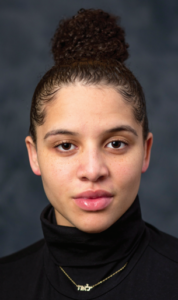Tag : youth activist
January 19, 2021 by admin
Freshman Year in a Pandemic

MAKEDA ZABOT-HALL, 18
My freshman year of college probably looks quite different from yours. I have to wear a mask while I use the bathroom. I’ve never seen the mouths of the people who serve me lunch every day. And my friends and I yearn to see invitations to events in our inboxes, that—just this once—won’t include a Zoom link, but instead will have a physical address, like the flyers that used to hang on the light posts where I grew up.
We often get asked if we feel like we’re missing out on the true experience of our first year in college. How can you miss something you’ve never experienced before? We only know college with Covid, so we’ve adapted—and learned how to find joy even if we can’t see each other smile. We still gathered to watch the debates and comment on the white men who express stronger enthusiasm for limiting reproductive choice then they do about disavowing white supremacy. We still argue and form relationships, some intimate and some not. And although we can’t gather in large groups, we still find ways to laugh over Zoom.
I’m glad to be here. I never got my ending of high school, or the chance to hug my best friend before I left for college. I spent a lot of the summer in my room, alone and unable to understand why I wished for the days to end as soon as they started. It wasn’t just the pandemic. Each day brought with it a new reason for why my brother sat at the diner table, anxious, or why my throat swelled up every time my parents asked if I was okay, or if I wanted to unpack the violent death of another human being whose name I couldn’t remember. Activists say “say their names,” but my mind shut down because I didn’t want to fathom the idea that this list of Black people cut down by the police would keep growing.
In the blur of the summer, these are the parts I remember. And then August 20th came, and my grandmother waved goodbye as I sat in the back seat of our rented car, and I prayed that God would keep her safe from those things that made my throat swell.
As my first few weeks on campus flew by, I finally understood what my mom had been telling me, and what her father had told her before she left for college: when children leave their home, they no longer see their parents as superheroes, but instead as people who make mistakes. I didn’t talk to my parents a lot my first few weeks on campus. I was bathing in the freedom, and I knew as soon as I picked up that phone I would be flipping the pages back to the previous chapter of my life. I missed my parents terribly, but I was determined to thrive in this new environment, and learn how to navigate this next chapter of my life that existed within a world that was falling apart.
The night of Yom Kippur, instead of attending the Kol Nidre service, I joined the circle on campus gathered together for a vigil that mourned the loss of Breonna Taylor. I listened as many young Black women spoke out about injustices they’ve faced and still face on campus. I watched tears stream down the faces of the very Black women that get up every day and fight for themselves, for their right to live and breathe.
Now, I keep replaying the vigil in my head. This Yom Kippur was different. I didn’t rid myself of my sins, because I still carry the guilt and pain of having not been able to fight hard enough for the names of the Black and brown beings who deserved so much more. But that’s okay. Because I also carry the names that shouldn’t and won’t be forgotten.
Makeda Zabot-Hall is a former JGirls editor, now a freshman at Brandeis and a Lilith blogger.
- No Comments
 Please wait...
Please wait...